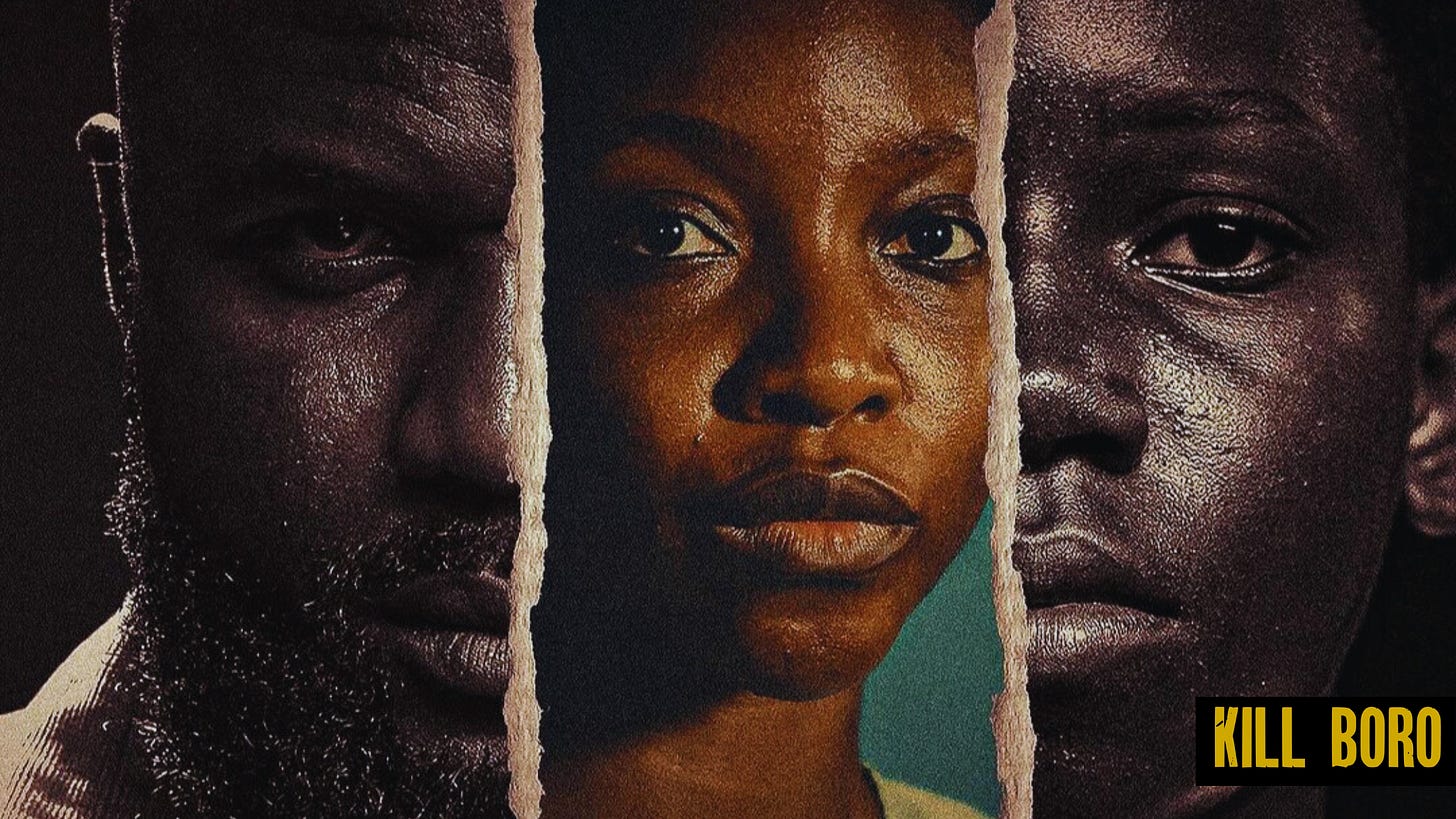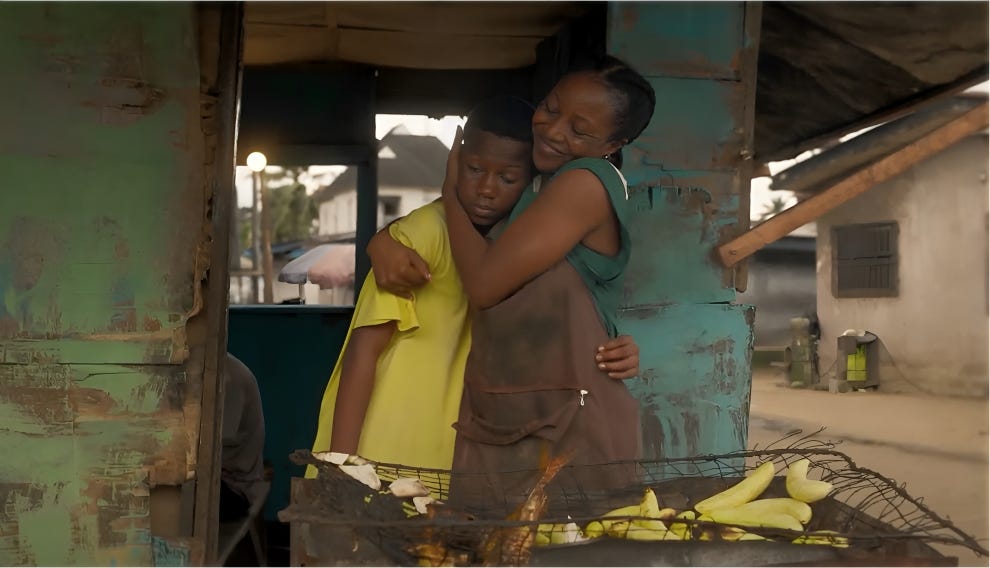Kill Boro: A Coming-of-Age Story Amidst Familial Conflict and Community Chaos
Courage Obayuwana's film is compelling and sheds light on the important themes it addresses.
Written by: Priye Diri and Kester Nsirim
Directed by: Courage Obayuwana
Starring: Philip Asaya, Ini Dima-Okojie, Kosisochukwu Ogboruche, Gregory Ojefua, Hilda Dokubo, Michael Dappa, Blessing Uzero, and many more.
When Kill Boro opens, it does so with the clanging sounds of war. Although we can’t hear it yet, the signs are there, and we know the full symphony of the inevitable clash between Jaguar (Yibo Koko) and Bossman Atemie (Gregory Ojefua) isn’t so far away.
Young Elijah (Kosisochukwu Ogboruche) and his family are ensnared in this conflict. His father, the titular Boro (Philip Asaya), is a deeply flawed man who owes debts everywhere, even across the sea. To make matters worse, he beats his wife, Elijah’s mom (Ini Dima-Okojie). This sets the stage for the film’s central mission: a son driven to wanting his father dead to save his mother.
But why would a son want his father dead? That is the question Kill Boro tries to answer amidst all the noise of communal war happening in the background.
Boro is a troubled man and in some ways a tragic character. Outside his home, he is a social nonentity. The militants across the sea want him only for his retired skills that fit their cause, but he spends the entire movie reiterating his commitment to the dull new life he promised his wife he’d stick to. His neighbours in the community know him as a chronic debtor with a gambling problem. This is perfectly illustrated during a scene at a bar, where Boro is engaged in a staked game of draft. When Boro hesitates to stake his treasured wristwatch of over 10 years, a background character interjects “Boro, you don’t even have anything to give. Just give him your life”. Clearly, there isn’t much respect for a man like this—one who gambles away his only son’s school fees and actively robs him of a shot at a decent life outside the slum they call home.
But it is these same problems that help to layer Boro, who we’re often reminded wasn’t always like this, with some complexities, especially when juxtaposed with interactions with his family at home. Boro does his best, in his twisted and unbalanced way, to defend their honor outside, albeit with way less ferocity as he muddies it with his vices. We get a glimpse of this when he cautions the same random guy at the bar to go ahead and insult him but to keep his family’s name out of their goddamn mouths. Outside, he is the social nonentity who seems willing to go to any lengths to protect his family, but within those closed four walls where he is the head and in charge, he is the monster whose actions have gone on to command the subjugation of his wife and the wrath of his only child. Like I said, tragic.

Director Courage Obayuwana’s vision is clear and relentless, refusing to shy away from the hardest parts of the subject matter. His intentionality in telling a visceral story without flinching enhances the film's raw and gritty narrative.
Philip Asaya admirably conveys Boro's struggles, bringing to mind his recent role as Sapele Water in Africa Magic’s Slum King. Both characters share ties to the Niger Delta militia and similar character traits of being temperamental, quick to anger, and steadfast in their self-destructive paths. However, while Sapele Water's conflict is driven by a quest for power, Boro's is rooted in family turmoil.
Asaya’s portrayal of Boro adds layers to the character that might have otherwise been lost. He captures the duality of Boro’s existence—the outward bravado and inner turmoil—with a nuanced performance that makes you almost sympathize with Boro, even as his actions make him hard to like. His ability to oscillate between the aggressive defender of his family's honor and the abusive, flawed patriarch helps maintain the audience's interest, even when the script falters. Asaya brings a depth to Boro that highlights the character's tragic flaws, making his journey all the more compelling when we arrive at his redemption.
Elijah's wanting to emancipate himself and his mom from Boro’s toxic reach is justified. For a child, he is carrying a burden too large for him, but like a lot of the other lessons he soon learns, life can be like that. His quest to get Bossman to do the dirty deed for him sets him on a path to discovering lessons about life he never thought he would. An early conversation with his mother sets up a lot of the lessons Elijah will go through during the film:
“You can’t fight evil with evil. Only good can fight evil.”
“But can it win?”
“Of course. If you believe.”
“Is that why you’re still with him? Even after everything he has done to you.” Elijah quizzes his mother.
Ini Dima-Okojie’s portrayal of Boma significantly elevates the material, grounding it in a level of believability that enhances the film’s impact. You hate Boro for what he does to his wife Boma and his son Elijah; then you pity Boro because he’s a victim of a force even he doesn’t fully understand is at play; but again, you find it hard to forgive Boro because his suffering isn’t enough excuse to make the lives of others he claims to love a living hell. It’s a profound message, on a road not commonly traveled, and the cast of Kill Boro helps to pass it across as well as they can with exalted performances.
Elijah’s coming-of-age is inevitable, and when his goal is finally within grasp, all those many lessons come into play to help him make a logical decision. Actor Kosisochukwu Ogboruche continues what I consider a winning streak with engaging onscreen performances. I saw him in Showmax’s Cheta’m earlier this year, where he played a young Obiajulu. He’s certainly one to watch out for.
The writing in Kill Boro is serviceable, quickly establishing the primary players, Boro’s flaws, and his family’s issues. However, the tension dissipates as swiftly as it builds by the end of the first act. A common problem in Nollywood films, including this one, is the lack of precision in entering and exiting scenes. This results in lengthy, unnecessary dialogue and a bloated runtime. Additionally, the sound design felt unbalanced in several scenes, which detracted from the overall viewing experience. Tighter pacing and a shorter runtime would have greatly benefited Kill Boro.
I appreciated the unique angle taken by Kill Boro in its storytelling. The narrative of a son wanting to kill his father is a rare one in our cinema these days, making it a refreshing change. As expected in stories featuring a villain with familial ties to the protagonist, a redemption arc is included. The antagonist here comes around and so also does our protagonist; everyone undergoes great changes by the time the journey is over. Ultimately, Kill Boro is a tale of pain, loss, and redemption, delivering a powerful message about the impact of violence within families. It may have had a happy ending, but that’s not always the case in real life, a message that’s hopefully not lost on those who need it to inspire them to change certain aspects of their lives.
Kill Boro is a compelling film that sheds light on the important themes it addresses. While it may not be perfect, its exploration of complex family relationships and the journey toward redemption make it a worthwhile watch.






